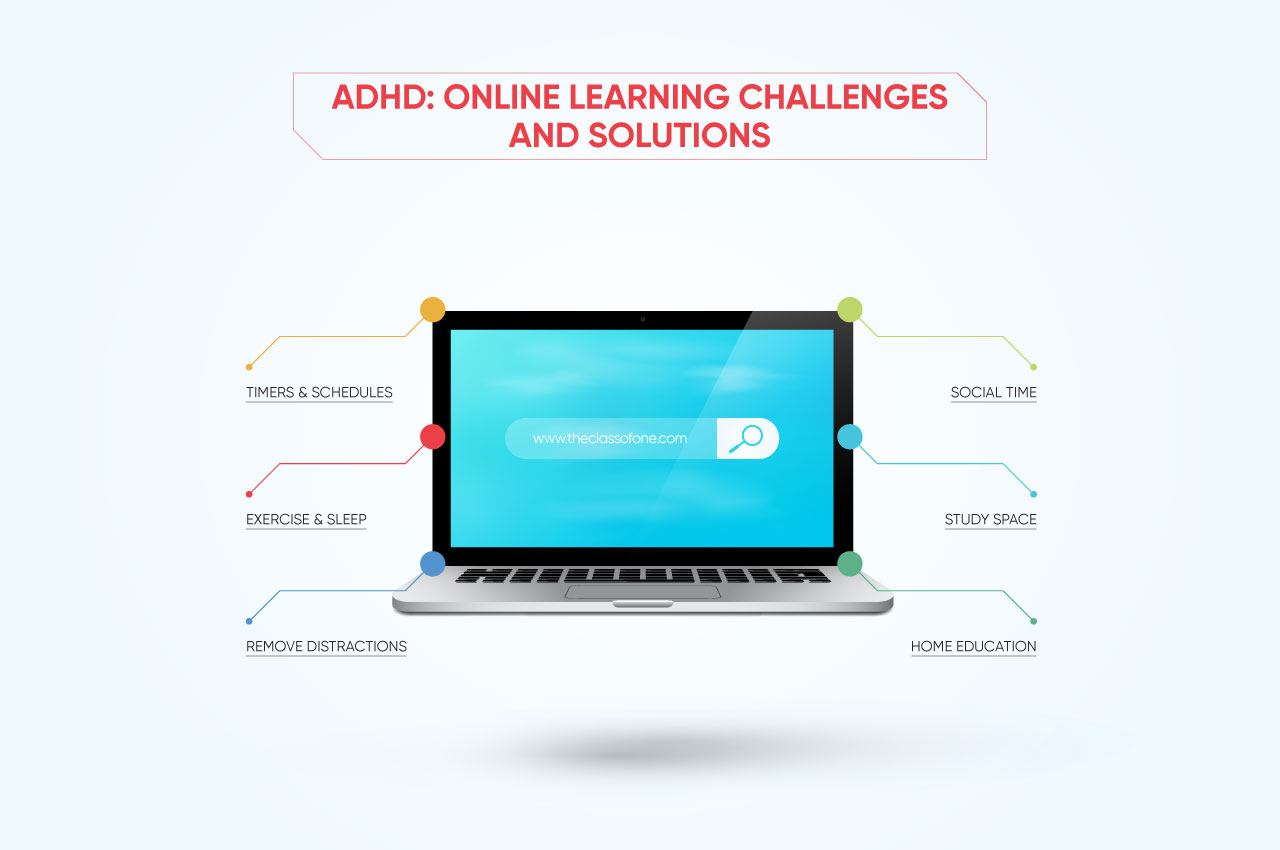




Traditional schooling is ill-equipped to handle children with learning disabilities and, more often than not, end up harming the child’s mental and academic development. Traditional schooling brings with it social pressures of performance and conformity that are hard for a child with learning disabilities. Online learning is a welcome respite for parents with children that want focused learning for their children. However, online learning can prove to be challenging for kids with ADHD that have a hard time paying attention to tasks at hand. Let’s look at some of the things that you can keep in mind as a parent to help your child with ADHD to get the best out of their online education.

Timers and Schedules
For kids with ADHD keeping track of schedules can be a challenge. Such students must have clear schedules marked out for them daily. Making use of timers will help students with ADHD know the amount of time a certain task requires and will not defer other tasks. Keep these schedules as visible as possible and create a daily predictable rhythm for your child. Check-in from time to time if the schedule is being followed and ensure that the child is adhering to the schedule. However, understand that children with ADHD will not be able to stick to a task for more than 45 minutes and would require breaks to recharge for the next task.
Exercise and Sleep
Completing tasks might be a challenge for a child with ADHD but make sure the child gets enough exercise and sleep. Exercise will keep the child’s mind active and recharged for tasks. While sleep will ensure that the knowledge gained from the tasks sticks in the brain. Sleep is also crucial for children with ADHD as it has proven to help them focus better. Aside from exercise and sleep, set some time aside every day for meditation which will help your child calm down and work through tasks more patiently. Spending too much time in front of the screen can have the adverse effect of damaging or weakening your child’s sight. Make sure your child practices eye exercises and blinks often.
Remove Distractions
Distractions are the opposite of what we want for a child with ADHD, so be sure to avoid anything that might prove to be a constant distraction for your child in their study area. Big windows, posters, toys, TV, etc. will steal your child’s attention and make them lose focus on the tasks at hand. Cell phones should be strictly off-limits when it’s study time and when the education is being done online block access to any other websites that might distract your child. During online education, there are many websites like YouTube that have pop-up ads that can be very distracting. Make sure you are using ad-blocker apps to block distracting ads or use premium packages to get rid of them.
Social Time
While online learning has its perks especially for someone with learning differences as it helps to avoid performance pressure and bullying, it is however important for students to get time to socialise and improve their social skills. Students should be encouraged to join online social clubs, participate in family activities and participate in group discussions when possible. It’s easier to ask questions in a traditional setting so encourage your child to ask questions in the comments section of online discussions and contribute to these discussions whenever possible. It’s also easy for students to fall for cyberbullying on online forums so keep an eye on your child’s conversations and block or report any miscreant that might be harassing your child.
Study Space
The study environment can make or break the study experience for your child with ADHD. Ask your child what kind of learning environment they prefer. Do they prefer to study at night? Does white noise help them focus better? Does studying in the bedroom tempt them to take a nap? Ask your child to assess their study environment from time to time so that it can be improved or changed to keep things fresh. The study space is not always physical, it can also be a virtual learning environment. Find out if the materials and the user interface of the education website your child uses are not conducive to your child’s learning. Maybe the website’s user interface is too cluttered or the educational tools are clunky and disrupt the study experience.
Home education for kids with ADHD can be a challenging prospect. But with perseverance and astute managerial skills, you can make learning successful for your child with ADHD. Just follow the points mentioned in the blog and you should have no problem getting your kid to meet her academic goals. Online learning is a great boon for parents looking for personalized education for their children. You can opt for a kid’s virtual school and make learning efficient and fun for your child. For further guidance, try out: theclassofone.com.
Yes, using a tablet for online school is a common and convenient practice. Tablets provide a portable and user-friendly platform for accessing online classes and educational materials.
Online school offers a flexible learning environment suitable for children. Scheduling with timers, incorporating breaks, and maintaining visible schedules help students with their tasks effectively.
Online classes for children offer structured schedules and clear routines. It also incorporates breaks for recharge, exercise and opportunity for students to interact while learning to provide them a wholesome learning experience.
Learning with ADHD involves implementing strategies such as setting clear schedules, incorporating regular breaks, maintaining a conducive study space, removing distractions, ensuring exercise and sufficient sleep, and promoting social interactions through online clubs and discussions.
Teaching an ADHD student online effectively involves understanding and accommodating their learning preferences. This includes creating a predictable rhythm, incorporating exercise and meditation, removing distractions, and actively participating in online social activities. It's important to adapt the study space based on the child's preferences for a successful learning experience.